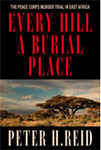Review — EVERY HILL A BURIAL PLACE by Peter H. Reid (Tanzania)
 Every Hill a Burial Place: The Peace Corps Murder Trial in East Africa
Every Hill a Burial Place: The Peace Corps Murder Trial in East Africa
By Peter H. Reid (Tanzania 1964-66)
University of Kentucky Press
332 pages
September 2020
$35.10 (Kindle); $36.95 (Hardcover)
A review by John Ratigan (Tanzania 1964-66)
•
Fifty-four years ago, in March 1966, in a small village in Tanzania, a young American woman died when she fell from a rocky hill where she and her husband of 16 months were picnicking. Peverly Dennett Kinsey, known to everyone by the descriptive nickname of “Peppy,” was a Peace Corps upper primary school teacher from Riverside, Connecticut, who had met and married her husband, Bill Kinsey, also a PCV upper primary school teacher, while they were in Peace Corps training at Syracuse University. Peppy had graduated only a few months before from Mount Holyoke College in South Hadley, Massachusetts. Bill was a ‘64 graduate of Washington and Lee University.
At first, Peppy’s fall was thought to be a tragic accident, and the Peace Corps prepared to return Bill to the United States. But African witnesses nearby reported that the couple had been arguing, then struggling with one another in what looked like a fight. Bill Kinsey was arrested shortly thereafter and charged with the murder of his wife.
The murder trial of Peace Corps Volunteer Bill Kinsey in a court room in Mwanza, Tanzania, on the shores of Lake Victoria, generated challenges well beyond the immediate personal challenge and distress of Bill Kinsey. President Julius Nyerere had brought his young country of Tanganyika to independence less than five years before. Only two years before, Nyerere had brokered a merger with the off-shore island of Zanzibar. He now faced an unwanted murder trial of an American citizen whose home-state politicians were demanding that President Johnson send US troops to Tanzania to bring Bill Kinsey home by military force.
The Peace Corps itself was less than five years old, already the personal legacy of Jack Kennedy but still struggling to find its feet. Peace Corps-Tanzania director Paul Sack, a successful real estate developer from San Francisco, was faced with a stressful choice: what were his and his organization’s obligations to the deceased Peppy and her bereaved family, and what were their obligations to Bill, suddenly on trial for his life? In Washington, new Peace Corps director Jack Vaughn had been in the job less than two months; he needed to decide those same questions.
Peter Reid, a Peace Corps teacher in Mwanza at the time and later a public interest lawyer in California, impressively documents the events and the actions of a wide array of players, both American and African, all the product of his extensive interviews, of Peace Corps documents, and of the detailed notes fortunately kept by many of the key players.
His book is both a movie-ready legal thriller, but also a study of two cultures brought together to decide a single question. You meet Oxford-trained Byron Georgiadis, the defense lawyer hired from Nairobi to defend Bill; Tanzania police inspector Martin Kifunta; Peace Corps doctor Tom McHugh; Senior State Prosecutor Ededen Effiwat, a Nigerian lawyer on loan to Tanzania; Yale lawyer Carroll Brewster advising the Kinseys; and the British judge Harold Platt, as well as much of the American expat community in and around Mwanza at the time.
Peter Reid (full disclosure: we have been friends since Peace Corps days) has done a superb job in laying out this international drama. He is consistently fact-based, and judicious in his judgments. This is not a pot-boiler or an accusatory effort: it is a fine piece of history of an unlikely event at a fascinating time and place when both the Peace Corps and the Republic of Tanzania were trying to find their way forward.
•
John Ratigan was a Peace Corps secondary school teacher in Bukoba, Tanzania from 1964-1966.
He later served with the State Department at Tehran, Cairo, Singapore, Toronto and Seoul.
No comments yet.
Add your comment